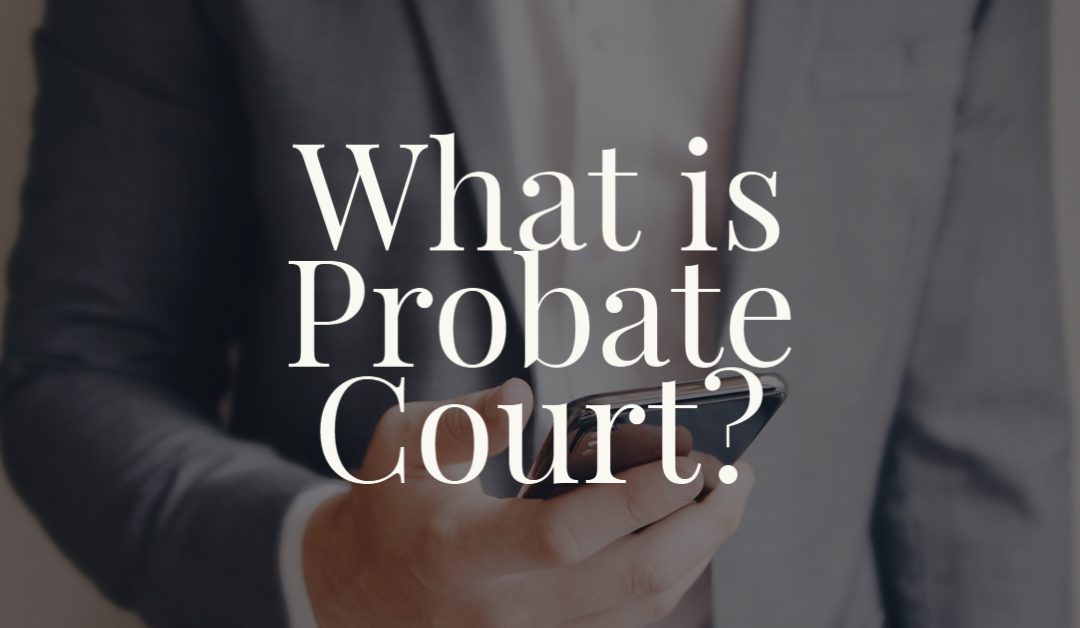Everyone over the age of 18 has an estate. Your estate is comprised of everything you own in addition to your minor children and pets. It’s crucial to make a plan for your estate before you die. Without a plan, your estate goes through a long court process known as probate. But what is probate court and how does it handle an estate?
Probate court is where a judge decides if your will is valid and assigns a personal representative to inventory your estate, pay your creditors and taxes, and distribute the assets to heirs. The court also decides the guardianship of any children and pets. Your estate also pays the court fees and a sum to the appointed representative.
If You Don’t Plan At All: Probate Court Without a Will
The idea of estate planning may seem complicated and over the top. You may feel tempted to just do nothing. However, without a will, the government takes complete control of the distribution of your assets after you pass.
Not having a will places your legacy in the hands of North Carolina intestacy laws and the interpretation of a judge. These laws very specifically lay out what happens when someone passes away without a will. They determine exactly who in your family will inherit. Beyond the laws, a judge whom you’ve never met decides everything else, including who will care for any children or pets.
If You Don’t Plan Beyond Your Will
Writing a will is a good start, but a will is not enough to communicate your wishes for your estate after you pass. If you make a will, but don’t plan beyond that, your estate still goes through the court process known as probate.
Take time to think strategically about how, when, and to whom your estate is divided and distributed to avoid probate court.
Why is Probate Court a Problem?
Probate is Public
Most people think of probate as a private process. However, since a loved one must file your will at the courthouse, probated estates are a matter of public record. That means your nosey neighbor can simply go down to the courthouse or hop online and find out everything about your estate.
Financial Predators
While today’s digital world is convenient, it’s also dangerous. Financial predators find ways to access information online. Since courts are part of a bureaucratic process that often moves slower than a glacier, months can elapse before the court realizes that your beneficiaries have been tricked.
Charities
Even the most well-meaning charities can become an annoyance when money is considered “up for grabs.” This is especially true in an estate situation when those inheriting assets want to do the right thing and honor their loved one.
Will Challengers
Public record documents in probate provide an opportunity for anyone to challenge the will. If your niece is always stirring up trouble and feels entitled to more than you, she can dispute the will in court and cause added heartache and court fees. These costs and the time defending the will can last for years.
How Can I Avoid Probate Court?
There are a few different ways you can avoid probate court for your estate. Writing a will is not enough, but the methods that do work are not overly complicated either.
One of the ways to avoid probate is to set up a trust. An experienced estate planning attorney can help you with this. A trust is basically a framework that owns your assets for you. It is a bit like a business that you own. Trusts are not filed with a court, either before or after your death. Probate courts do not supervise trust administration so they act to keep your legal affairs private and your assets safe.
Other types of assets that avoid probate court and go immediately to the named beneficiaries listed include:
- Retirement accounts, for example IRAs or 401(k)
- Life insurance and pension plan distributions
- Payable-on-death (POD) accounts
- U.S. savings bonds and securities with a transfer-on-death (TOD)
- Real estate owned jointly with right of survivorship
The important point with these assets is staying up to date naming your beneficiaries for each account. If you list the wrong beneficiary, it will not go to the one you correctly named in a will. Beneficiaries who are on the accounts inherit the assets no matter what you’ve stated elsewhere. So take the time to check over your beneficiaries regularly. With divorce, births, and deaths in the family, you may need to make updates often.
Between your beneficiary accounts and setting up a trust, you can plan for the bulk of your estate to stay out of probate court. An attorney can also help you plan further to avoid any other expenses that may lurk in wait for your heirs’ inheritance. With a bit of help, your estate can avoid financial predators, court fees, entitled or scheming relatives, and other threats.
Make Your Plan
There are few things as intimidating as the project of estate planning. The best time to plan for your incapacity or death, though, is while you’re still healthy. With a bit of time, effort, and guidance from a trusted estate planning attorney, you can develop a plan and obtain peace of mind. Failing to do so can place the security of your family and assets in jeopardy.
At Hopler, Wilms, and Hanna, our experienced probate attorneys can help you make the most informed decisions possible. We help to preserve your legacy while planning for your future goals. Let us work with you to create an estate plan that avoids probate and keeps your family and financial affairs private. Find out how we can help you prepare for your future and that of your family. Contact us today and set up an initial consultation.

